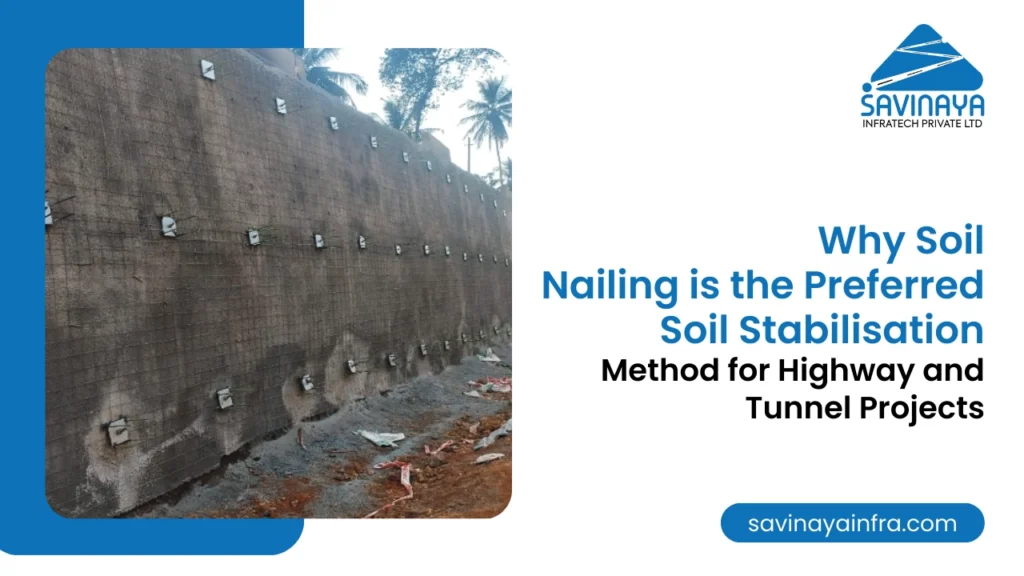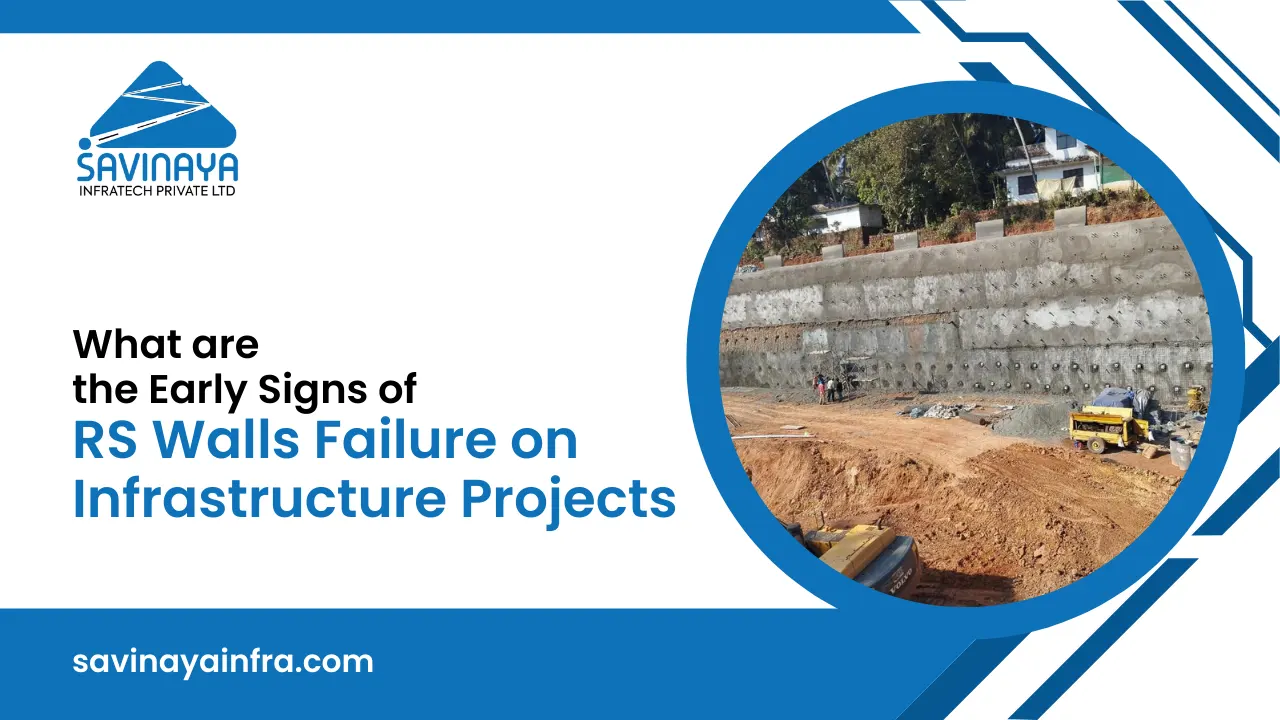When it comes to building highways or tunnels in hilly, unstable, or soft soil areas, slope stabilization becomes a top priority. Among the many slope stabilisation methods available today, soil nailing stands out as one of the most practical and widely used solutions.
Put simply, soil nailing involves reinforcing the existing ground by inserting closely spaced steel bars known as soil nails, into the slope or excavation face. This technique not only strengthens the ground but also helps retain it during and after construction.
In India, where over 77,000 kilometers of national highways are being developed or upgraded under programs like Bharatmala Pariyojana and NHAI’s Greenfield Expressway Projects, advanced techniques such as soil nailing have become vital, especially in the Northeast, Himalayan regions, and Western Ghats where conventional methods are not feasible due to space, slope, or environmental constraints (NHAI Annual Report 2025).
Soil nailing is now commonly used in Indian tunnel portals, hill-cut widening projects, and emergency slope failure repairs, thanks to its minimal equipment footprint and faster installation time.
In this blog, we’ll explore why soil nailing is preferred for major infrastructure projects like highways and tunnels, where safety, speed, and cost all matter.
Key Takeaways
- Soil nailing is a widely adopted method for stabilizing slopes in hilly, soft, or unstable ground conditions.
- The technique involves inserting steel bars (soil nails) into the soil to reinforce and retain the slope or excavation face.
- Common applications include road embankments, tunnel portals, temporary excavations, and stabilizing existing weak or eroding slopes.
- Soil nailing is preferred for its quick installation, lower cost, flexibility in difficult terrain, and minimal disruption to surrounding areas.
- It offers proven safety and long-term performance, making it a trusted solution by engineers and contractors.
- Integrated monitoring systems are increasingly used to detect ground movement early, ensuring proactive safety measures.
- As infrastructure demand grows, soil nailing remains a sustainable and efficient slope stabilization solution.
Table of Contents
Key Applications of Soil Nailing in Highway and Tunnel Projects
The application of soil nailing is especially useful in large infrastructure projects where ground stability is uncertain. You’ll likely find it used in the following scenarios:
- Soil nailing for highways: In road construction through hilly or mountainous terrain, soil nails for slope stability help prevent landslides and erosion by reinforcing the road embankments.
- Soil nailing for tunnel portals: At the entry and exit points of tunnels, the soil around the face can be unstable. Using soil nailing here prevents collapse and provides safety for workers and equipment.
- Temporary excavations: Especially where the top down excavation method is used, soil nailing helps hold back the earth while the permanent structure is being built.
- Reinforcement of existing slopes: In cases where older slopes show signs of movement or erosion, soil nailing is used to bring stability without removing large sections of land.
These examples show how versatile and essential this technique is for modern civil engineering projects.
Key Reasons to Prefer Soil Nailing for Highway and Tunnel Side Construction
There are several strong reasons why government agencies & infrastructure developers choose soil nailing over other options:
1. Speed of Execution
On the one hand, building traditional retaining structures takes significant time. On the other hand, soil nailing services can be completed faster with less disruption, making them ideal for active construction zones like roads and tunnels.
2. Cost Efficiency
Since soil nailing systems use less concrete and steel, the overall cost tends to be lower. There’s also minimal excavation, which means less hauling and backfilling.
3. Flexibility in Complex Terrain
In irregular or steep slopes, ground nailing allows precise, targeted support. This method adapts to the natural shape of the ground, unlike rigid wall systems.
4. Minimal Surface Disruption
Because most of the work is done without removing large amounts of soil, soil nailing equipment causes less vibration and noise ; a major plus near populated or sensitive areas.
5. Proven Safety and Performance
Over the years, the advantages of soil nailing have been demonstrated in numerous projects. It’s widely accepted by engineers as a reliable solution for slope stabilization, especially in unpredictable conditions.
Interesting Reads: Soil Nailing Cost Guide: What to Expect in 2025
The Future of Soil Nailing
The future looks promising for soil nailing as infrastructure needs grow in both urban and remote regions. With increasing demand for efficient slope stabilization , engineers continue to develop better materials, faster soil nailing equipment, and even automated systems for precision placement of soil nails.
Additionally, the integration of monitoring tools within the soil nailing system ensures that any shifts in ground movement can be detected early, making it safer and more proactive.
As more governments and construction firms recognize the importance of sustainable and cost-effective techniques, soil nailing will likely continue to lead the way.
Conclusion
Working on a steep slope, a tunnel portal, or a highway cut section often brings serious ground stability challenges. In such cases, soil nailing offers a smart, efficient, and durable solution. From fast setup and lower cost to adaptability and safety, the advantages of soil nailing make it a preferred choice across modern infrastructure projects.
Talk to Soil Nailing Contractor Today
Looking for expert soil nailing services for your next project?
At Savinaya Infratech, we specialize in slope and tunnel stabilization using proven soil nailing systems. Our team uses advanced soil nailing equipment and brings years of experience in delivering safe, efficient, and long lasting results. Get in touch with a trusted soil nailing contractor today and let’s discuss how we can support your project from the ground up.


